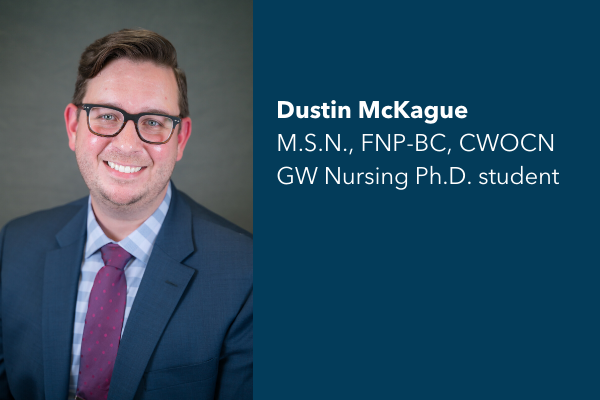The pursuit of higher education and advanced degrees requires some sacrifice — time and money, at least. But to Dustin McKague, MSN, FNP-BC, CWOCN, who starts the GW Nursing Doctor of Philosophy (Ph.D.) program this month, advanced degrees are essential to the advancement of nursing as a whole.
“Nursing needs to rise to the occasion and train more nurses at advanced levels because we’re all participating in the science of the human experiment,” Mr. McKague said. “Without having nurses prepared by an advanced education, we’re not able to ask or answer questions related to the field of nursing.”
He’s not alone in his thinking. The Institute of Medicine’s 2013 report, “The Future of Nursing: Leading Change, Advancing Health,” includes a key recommendation that at least 80 percent of nurses should hold a bachelor’s degree or higher by 2020. But less than 1 percent of nurses are Ph.D.-prepared researchers and faculty who could ask and answer critical questions.
“As nurses, we’re not really trained in statistical analysis, research design or research appraisal,” said Mr. McKague. “Without these skills, we won’t be able to make changes to the science of nursing.”
Mr. McKague plans to use his recently earned nurse practitioner credential and future Ph.D. to answer his own nursing science questions through research. “I want to confidently and comfortably sit at the table in an interdisciplinary way and have my own experiences and knowledge that I bring to the table,” he said. “That doesn’t happen often when you have a lower level of educational attainment.”
His research will help him further promote the necessity of an advanced degree and contribute to his desired career in education and teaching. “I want to make sure that the way we’re educating nurses, from a distance-learning perspective, is the right way,” he said. “[Nursing] requires contact with humans, and without having simulations and clinical rotations, you can’t do the job.”
Like many students these days, Mr. McKague has experience in distance learning. While living in Eugene, Ore., he completed his master’s degree at GW Nursing, earning his family nurse practitioner credential, and he will finish his Ph.D. in the same manner.
“We all have different experiences in the ways we gain knowledge,” said Mr. McKague. “At GW, I was on campus four times, and I really valued those components, whereas friends in similar programs at other institutions had no on-campus components.” He noted that, in medicine, clinical education requirements are generally standardized. “Why isn’t there a standard way of educating nurse practitioners?” he wondered.
Understanding the increase in online and hybrid education, Mr. McKague hopes to “fine tune” the way education is delivered to nurses. “I want to answer questions on how to train professional nurses who are still working and have a family and a life but want to answer the call of advanced education,” said Mr. McKague. “I want nurses to participate in health care sciences and research and quality metrics because once they do that, then I think they get very motivated to get an advanced degree to back up the work they’re doing.”


